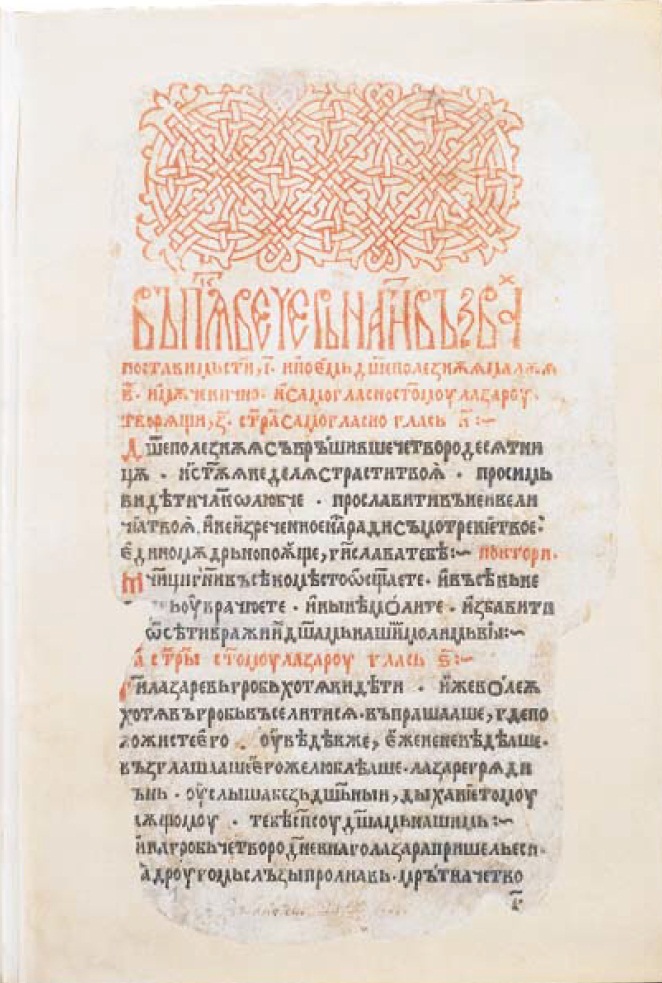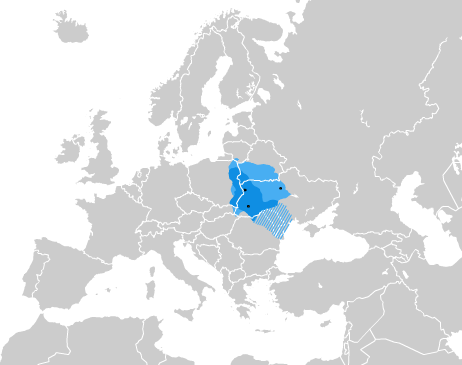|
Iazychie
Iazychie ( uk, Язичіє, translit=Yazychiie; rue, Язычіє, translit=Yazŷchiie) was an artificial literary East Slavic language used in the 19th century and the early 20th century in Halychyna, Bukovina, and Zakarpattia in publishing, particularly by Ukrainian and Carpatho-Rusyn Russophiles (Moskvophiles).Zhovtobryukh, M.A. Iazychie'. Ukrainian Soviet Encyclopedia. It was an unsystematic combination of Russian with the lexical, phonetic and grammatical elements of vernacular Ukrainian and Rusyn, Church Slavonic, Ruthenian, Polish, and Old Slavic. The term was introduced by Ukrainophiles, who used it pejoratively. Nikolay Chernyshevsky called "Iazychie" a mutilation of the language and sharply condemned it. Ivan Franko and other representatives of the contemporary territories of today's Western Ukraine's progressive intelligentsia The intelligentsia is a status class composed of the university-educated people of a society who engage in the complex mental lab ... [...More Info...] [...Related Items...] OR: [Wikipedia] [Google] [Baidu] |
East Slavic Language
The East Slavic languages constitute one of three regional subgroups of the Slavic languages, distinct from the West and South Slavic languages. East Slavic languages are currently spoken natively throughout Eastern Europe, and eastwards to Siberia and the Russian Far East. In part due to the large historical influence of the Russian Empire and the Soviet Union, the language is also spoken as a lingua franca in many regions of Caucasus and Central Asia. Of the three Slavic branches, East Slavic is the most spoken, with the number of native speakers larger than the Eastern and Southern branches combined. The common consensus is that Belarusian, Russian and Ukrainian are the existent East Slavic languages; Rusyn is mostly considered as a separate language too, but some classify it as a dialect of Ukrainian. The East Slavic languages descend from a common predecessor, the language spoken in the medieval Kievan Rus' (9th to 13th centuries), the Rus' language which later evo ... [...More Info...] [...Related Items...] OR: [Wikipedia] [Google] [Baidu] |
Old Slavic
Old Church Slavonic or Old Slavonic () was the first Slavic literary language. Historians credit the 9th-century Byzantine missionaries Saints Cyril and Methodius with standardizing the language and using it in translating the Bible and other Ancient Greek ecclesiastical texts as part of the Christianization of the Slavs. It is thought to have been based primarily on the dialect of the 9th-century Byzantine Slavs living in the Province of Thessalonica (in present-day Greece). Old Church Slavonic played an important role in the history of the Slavic languages and served as a basis and model for later Church Slavonic traditions, and some Eastern Orthodox and Eastern Catholic churches use this later Church Slavonic as a liturgical language to this day. As the oldest attested Slavic language, OCS provides important evidence for the features of Proto-Slavic, the reconstructed common ancestor of all Slavic languages. Nomenclature The name of the language in Old Church Slavonic ... [...More Info...] [...Related Items...] OR: [Wikipedia] [Google] [Baidu] |
Izbornyk
Izbornyk is an internet-library project of the old Ukrainian literature also known as "History of Ukraine 9-18th centuries. Primary sources and interpretation". It functions since the 21st of August 2001. The project is a collection of major works on history of Ruthenia, Cossack Hetmanate and Ukraine. The project covers the following main subjects: Chronicles, Linguistics, History, Old Ukrainian Literature, Taras Shevchenko, Political Science, Literary Studies, Grammar and lexicons, Historical maps. 2016, according to website visit statistics, there are from 200,000 to 500,000 visitors per month. Idea A library is a collection of ebooks and texts, combined with a declared theme and a single idea. The idea behind the project is to strive to collect as many works of Ukrainian writing as possible, not simply as a random collection of texts from different times and authors, but against the backdrop of a holistic cultural and historical process, which would make it clear the uni ... [...More Info...] [...Related Items...] OR: [Wikipedia] [Google] [Baidu] |
Orest Subtelny
Orest Subtelny ( uk, О́рест Субте́льний, 17 May 1941 – 24 July 2016) was a Ukrainian-Canadian historian. Born in Kraków, Poland, he received his doctorate from Harvard University in 1973. From 1982 to 2015, he was a Professor in the Departments of History and Political Science at York University in Toronto. Early life Orest Subtelny was born in Krakow, General Government, on May 17, 1941.Passings: Orest Subtelny made significant contributions to history research York University. July 27, 2016 His father, Myroslav, was a lawyer who had lived in the c ... [...More Info...] [...Related Items...] OR: [Wikipedia] [Google] [Baidu] |
Intelligentsia
The intelligentsia is a status class composed of the university-educated people of a society who engage in the complex mental labours by which they critique, shape, and lead in the politics, policies, and culture of their society; as such, the intelligentsia consists of scholars, academics, teachers, journalists, and literary writers. Conceptually, the intelligentsia status class arose in the late 18th century, during the Partitions of Poland (1772–1795). Etymologically, the 19th-century Polish intellectual Bronisław Trentowski coined the term ''inteligencja'' (intellectuals) to identify and describe the university-educated and professionally active social stratum of the patriotic bourgeoisie; men and women whose intellectualism would provide moral and political leadership to Poland in opposing the cultural hegemony of the Russian Empire. In pre–Revolutionary (1917) Russia, the term ''intelligentsiya'' (russian: интеллигенция) identified and described the ... [...More Info...] [...Related Items...] OR: [Wikipedia] [Google] [Baidu] |
Western Ukraine
Western Ukraine or West Ukraine ( uk, Західна Україна, Zakhidna Ukraina or , ) is the territory of Ukraine linked to the former Kingdom of Galicia–Volhynia, which was part of the Polish–Lithuanian Commonwealth, the Austrian Empire, Austria-Hungary and the Second Polish Republic, and came fully under the control of the Soviet Union (via the Ukrainian Soviet Socialist Republic) only in 1939, following the Molotov–Ribbentrop Pact. There is no universally accepted definition of the territory's boundaries (see the map, right), but the contemporary Ukrainian administrative regions or Oblasts of Chernivtsi, Ivano-Frankovsk, Lviv, Ternopil and Transcarpathia (which were part of the former Austro-Hungarian Empire) are nearly always included and the Lutsk and Rivne Oblasts (parts of the annexed from Poland during its Third Partition) are usually included. It is less common to include the Khmelnytski and, especially, the Vinnytsia and Zhytomyr Oblasts in ... [...More Info...] [...Related Items...] OR: [Wikipedia] [Google] [Baidu] |
Ivan Franko
Ivan Yakovych Franko ( Ukrainian: Іван Якович Франко, pronounced ˈwɑn ˈjɑkowɪtʃ frɐnˈkɔ 27 August 1856 – 28 May 1916) was a Ukrainian poet, writer, social and literary critic, journalist, interpreter, economist, political activist, doctor of philosophy, ethnographer, and the author of the first detective novels and modern poetry in the Ukrainian language. He was a political radical, and a founder of the socialist and nationalist movement in western Ukraine. In addition to his own literary work, he also translated the works of such renowned figures as William Shakespeare, Lord Byron, Pedro Calderón de la Barca, Dante Alighieri, Victor Hugo, Adam Mickiewicz, Johann Wolfgang von Goethe and Friedrich Schiller into Ukrainian. His translations appeared on the stage of the Ruska Besida Theatre. Along with Taras Shevchenko, he has had a tremendous impact on modern literary and political thought in Ukraine. Life Franko was born in the Ukrainian villag ... [...More Info...] [...Related Items...] OR: [Wikipedia] [Google] [Baidu] |
Nikolay Chernyshevsky
Nikolay Gavrilovich Chernyshevsky ( – ) was a Russian literary and social critic, journalist, novelist, democrat, and socialist philosopher, often identified as a utopian socialist and leading theoretician of Russian nihilism. He was the dominant intellectual figure of the 1860s revolutionary democratic movement in Russia, despite spending much of his later life in exile to Siberia, and was later highly praised by Karl Marx, Georgi Plekhanov, and Vladimir Lenin. Biography The son of a priest, Chernyshevsky was born in Saratov in 1828, and stayed there until 1846. He graduated at the local seminary where he learned English, French, German, Italian, Latin, Greek and Old Slavonic. It was there he gained a love of literature. At St Petersburg University he often struggled to warm his room. He kept a diary of trivia like the number of tears he shed over a dead friend. It was here that he became an atheist. He was inspired by the works of Hegel, Ludwig Feuerbach and Charles ... [...More Info...] [...Related Items...] OR: [Wikipedia] [Google] [Baidu] |
Paul Robert Magocsi
Paul Robert Magocsi (born January 26, 1945 in Englewood, New Jersey) is an American professor of history, political science, and Chair of Ukrainian Studies at the University of Toronto. He has been with the university since 1980, and became a Fellow of the Royal Society of Canada in 1996. He currently acts as Honorary Chairman of the World Congress of Rusyns, and has authored many books on Rusyn history. Born in Englewood, New Jersey, Magocsi (his surname Magocsi is pronounced something like "magótchy", varying in different languages) is of Hungarian and Ruthenian (Rusyn) descent. He completed his undergraduate studies at Rutgers University B.A. in 1966; M.A. 1967, Princeton University in M.A. 1969, Ph.D. 1972. He then went to Harvard University, where he was a member of the Society of Fellows between 1973 and 1976. In 2013 he was awarded doctor honoris causa by the University of Prešov in Slovakia. Magocsi has taught at Harvard University and the Hebrew University in J ... [...More Info...] [...Related Items...] OR: [Wikipedia] [Google] [Baidu] |
Polish Language
Polish (Polish: ''język polski'', , ''polszczyzna'' or simply ''polski'', ) is a West Slavic language of the Lechitic group written in the Latin script. It is spoken primarily in Poland and serves as the native language of the Poles. In addition to being the official language of Poland, it is also used by the Polish diaspora. There are over 50 million Polish speakers around the world. It ranks as the sixth most-spoken among languages of the European Union. Polish is subdivided into regional dialects and maintains strict T–V distinction pronouns, honorifics, and various forms of formalities when addressing individuals. The traditional 32-letter Polish alphabet has nine additions (''ą'', ''ć'', ''ę'', ''ł'', ''ń'', ''ó'', ''ś'', ''ź'', ''ż'') to the letters of the basic 26-letter Latin alphabet, while removing three (x, q, v). Those three letters are at times included in an extended 35-letter alphabet, although they are not used in native words. The traditiona ... [...More Info...] [...Related Items...] OR: [Wikipedia] [Google] [Baidu] |
Halychyna
Galicia ()"Galicia" '' Collins English Dictionary'' ( uk, Галичина, translit=Halychyna ; pl, Galicja; yi, גאַליציע) is a historical and geographic region spanning what is now southeastern Poland and western Ukraine, long part of the Polish–Lithuanian Commonwealth.See also: It covers much of such historic regions as [...More Info...] [...Related Items...] OR: [Wikipedia] [Google] [Baidu] |
Ruthenian Language
Ruthenian (Belarusian: руская мова; Ukrainian: руська мова; Ruthenian: руска(ѧ) мова; also see other names) is an exonymic linguonym for a closely-related group of East Slavic linguistic varieties, particularly those spoken from the 15th to 18th centuries in the Grand Duchy of Lithuania and in East Slavic regions of the Polish–Lithuanian Commonwealth. Regional distribution of those varieties, both in their literary and vernacular forms, corresponded approximately to the territories of the modern states of Belarus and Ukraine. By the end of the 18th century, they gradually diverged into regional variants, which subsequently developed into the modern Belarusian, Ukrainian, and Rusyn languages. In the Austrian and Austro-Hungarian Empires, the same term (german: ruthenische Sprache, hu, Rutén nyelv) was employed continuously (up to 1918) as an official exonym for the entire East Slavic linguistic body within the borders of the Monarchy ... [...More Info...] [...Related Items...] OR: [Wikipedia] [Google] [Baidu] |





